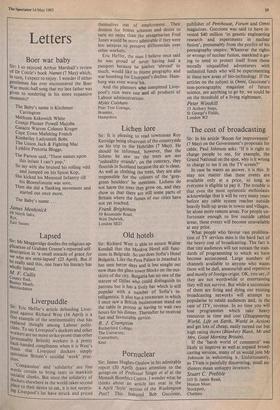The cost of broadcasting
Sir: In his article 'Room for improvement' (7 May) on the Government's proposals for cable, Paul Johnson asks: 'If it is right to charge people to see, for example, the Grand National on the spot, why is it wrong to charge to see it on the TV screen?'
In case he wants an answer, it is this. It may not matter that these events are available only at a price, so long as everyone is eligible to pay it. The trouble is that even the most optimistic enthusiasts acknowledge that it will be very many years before any cable system reaches outside heavily built-up areas in towns and villages, let alone more remote areas. For people un- fortunate enough to live outside cabled areas, these events will become unavailable at any price.
What people who favour vast prolifera- tion of TV services miss is the hard fact of the heavy cost of broadcasting. The fact is that tiny audiences will not sustain the stan- dards of programming to which we have become accustomed. Large numbers of channels available to anyone who wants them will be dull, amateurish and repetitive and mostly of foreign origin. OK, you say, if they are not worthwhile or entertaining they will not survive. But while a succession of them are living and dying our existing broadcasting networks will attempt to popularise to retain audiences and, in the case of ITV, revenue. In no time you will lose programmes which take heavy resources in time and cost (Disappearing World, Life on Earth, World in Action) and get lots of cheap, easily turned out but high rating shows (Blankety Blank, Mr and Mrs, Good Morning Britain).
If the 'harsh world of commerce' was likely to improve as well as expand broad- casting services, many of us would join Mr Johnson in welcoming it. Unfortunately, as TVam is painfully discovering, small au- diences mean unhappy investors.
Stuart C. Prebbie
103 St James Road, Heaton Moor, Stockport, Cheshire










































 Previous page
Previous page